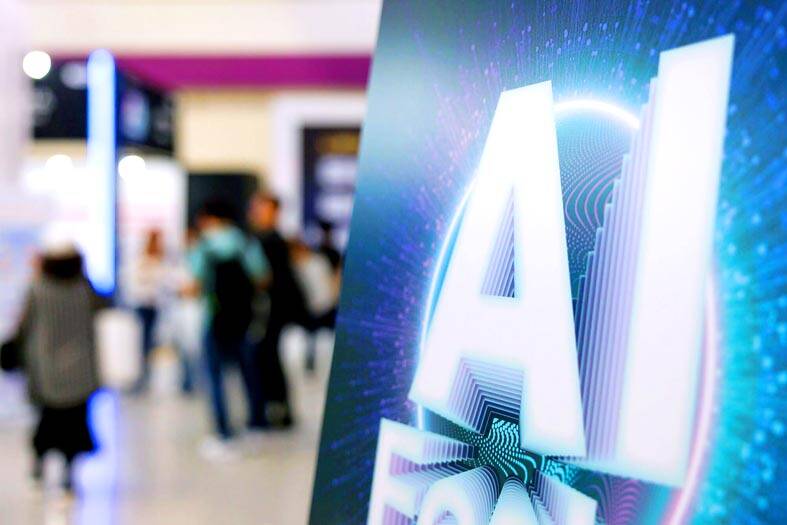Equity investors seeking exposure to the hot artificial intelligence (AI) theme should look for opportunities in Asia, as US tech companies face stretched valuations, Saxo Markets said.
“Asia offers a cheaper, more earnings-anchored route into the same megatrend,” Charu Chanana, chief investment strategist at Saxo in Singapore, wrote in a note. “Roughly 70 percent of global chipmaking, 90 percent of AI memory, and almost all advanced packaging capacity sit in Taiwan, [South] Korea and Japan — making the region indispensable to the AI ecosystem.”
On the other hand, US tech valuations are elevated, and companies there are facing several risks such as concentration and circularity, she said.

Photo: Bloomberg
The S&P 500 Information Technology Index is trading at almost 30 times its one-year forward earnings, versus a multiple of 17 for the MSCI Asia Pacific Information Technology Index, data compiled by Bloomberg showed.
Saxo’s comments come as investors have been getting increasingly concerned about overheated valuations for some of the biggest AI winners, particularly US-based innovation leaders such as Nvidia Corp. More recently, a wave of circular deals involving OpenAI, Nvidia and other AI-focused firms has sparked additional worries that the boom is being artificially propped up.
While Asian AI-linked firms also share the “global cycle risk,” they offer better earnings visibility as much of the capital expenditure to build AI infrastructure flows into Asian supply chains, Chanana said.
“The physical build-out of AI infrastructure — chips, servers, data centers — continues at full speed, and much of that is happening in Asia,” she added.
Separately, Goldman Sachs Group Inc strategist Peter Oppenheimer, who correctly predicted Wall Street’s underperformance this year, said he expected US equities to keep lagging for the next decade.
Oppenheimer and his team recommended that investors increase diversification beyond the US as elevated stock valuations put a lid on gains.
They said they expect the S&P 500 to achieve annual returns of 6.5 percent in the coming 10 years, the weakest among all regions.
Emerging markets (EM) are projected to be strongest, at 10.9 percent a year, they said.
“Diversify beyond the US, with a tilt toward emerging markets,” Oppenheimer and his team wrote in a note. “We expect higher nominal GDP growth and structural reforms to favor EM, while AI’s long-term benefits should be broad-based rather than confined to US technology.”
The strategists said in the coming years they expect EM gains to be driven by strong earnings growth in China and India.
Asia excluding-Japan is seen as the second-best performer with a 10.3 percent annual return, they said, adding that Japan is set to achieve 8.2 percent, underpinned by earnings growth and policy-led improvements in investor payouts.
Europe is expected to hand investors a 7.1 percent annual return, they said.

CHIP RACE: Three years of overbroad export controls drove foreign competitors to pursue their own AI chips, and ‘cost US taxpayers billions of dollars,’ Nvidia said China has figured out the US strategy for allowing it to buy Nvidia Corp’s H200s and is rejecting the artificial intelligence (AI) chip in favor of domestically developed semiconductors, White House AI adviser David Sacks said, citing news reports. US President Donald Trump on Monday said that he would allow shipments of Nvidia’s H200 chips to China, part of an administration effort backed by Sacks to challenge Chinese tech champions such as Huawei Technologies Co (華為) by bringing US competition to their home market. On Friday, Sacks signaled that he was uncertain about whether that approach would work. “They’re rejecting our chips,” Sacks

NATIONAL SECURITY: Intel’s testing of ACM tools despite US government control ‘highlights egregious gaps in US technology protection policies,’ a former official said Chipmaker Intel Corp has tested chipmaking tools this year from a toolmaker with deep roots in China and two overseas units that were targeted by US sanctions, according to two sources with direct knowledge of the matter. Intel, which fended off calls for its CEO’s resignation from US President Donald Trump in August over his alleged ties to China, got the tools from ACM Research Inc, a Fremont, California-based producer of chipmaking equipment. Two of ACM’s units, based in Shanghai and South Korea, were among a number of firms barred last year from receiving US technology over claims they have

It is challenging to build infrastructure in much of Europe. Constrained budgets and polarized politics tend to undermine long-term projects, forcing officials to react to emergencies rather than plan for the future. Not in Austria. Today, the country is to officially open its Koralmbahn tunnel, the 5.9 billion euro (US$6.9 billion) centerpiece of a groundbreaking new railway that will eventually run from Poland’s Baltic coast to the Adriatic Sea, transforming travel within Austria and positioning the Alpine nation at the forefront of logistics in Europe. “It is Austria’s biggest socio-economic experiment in over a century,” said Eric Kirschner, an economist at Graz-based Joanneum

BUBBLE? Only a handful of companies are seeing rapid revenue growth and higher valuations, and it is not enough to call the AI trend a transformation, an analyst said Artificial intelligence (AI) is entering a more challenging phase next year as companies move beyond experimentation and begin demanding clear financial returns from a technology that has delivered big gains to only a small group of early adopters, PricewaterhouseCoopers (PwC) Taiwan said yesterday. Most organizations have been able to justify AI investments through cost recovery or modest efficiency gains, but few have achieved meaningful revenue growth or long-term competitive advantage, the consultancy said in its 2026 AI Business Predictions report. This growing performance gap is forcing executives to reconsider how AI is deployed across their organizations, it said. “Many companies